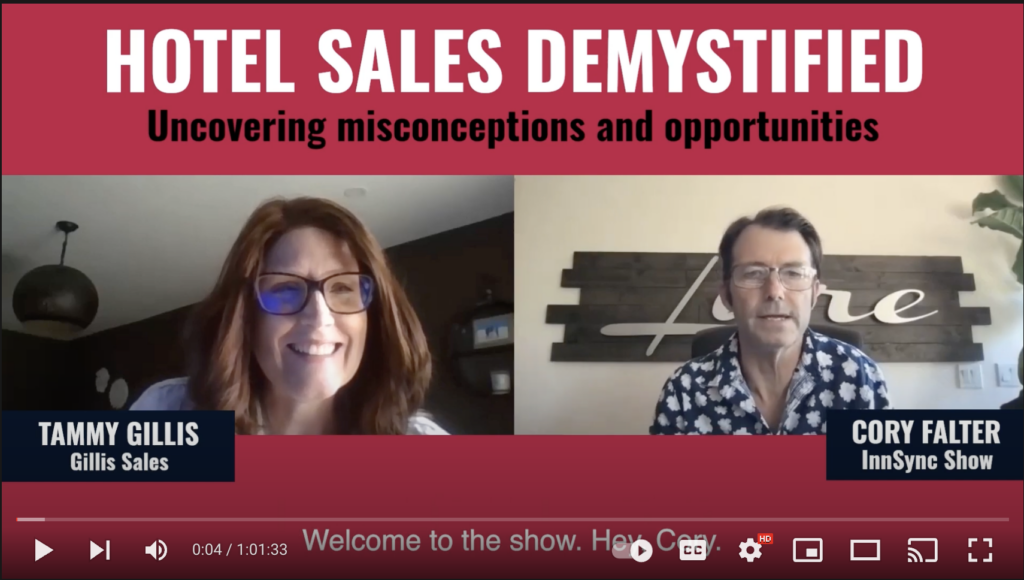
Uncovering misconceptions and unlocking opportunities.
Sales representatives are the lifeblood of hotels. They are responsible for bringing in new business and keeping existing customers satisfied. The hotel sales process can be complex, but it doesn't have to be mysterious.
The InnSync Show’s Cory Falter recently chatted with Tammy Gillis, sales performance expert from Gillis Consulting and Training, Inc., and we're demystifying the hotel sales process so you can close more business deals and grow the bottom line.
Understand the Strengths of Your Hotel Sales Team
The most important consideration for your hotel sales team is understanding that not all salespeople are good at all aspects, and all stages, of the sales process.
Tammy says there are two distinct sales types: gathering and hunting.
She recommends managers take a step back and ask:
- What specifically do you need?
- What does your sales structure need to look like?
- What does your segmentation look like?
Do you need someone to manage incoming inquiries (gathering), or are you in a market that's so competitive that you need someone assertive who will be on the lookout for business (hunting)?
One of the biggest misconceptions is that all salespeople are equal.
Tammy says, "not all salespeople enjoy all parts of the sales process. Just because a sales rep loves relationship-building doesn't mean they will love cold-calling 90% of the time."
The second consideration is what your sales team's strengths are. Tammy cautions, "Hiring a sales rep and then putting them in a role that doesn't suit their strengths is a recipe for disaster."
For example, if you have an introverted sales rep who hates cold-calling, don't put them on the phone. Instead, give them large territories where they can focus on building relationships with existing customers.
Conversely, if you have an extroverted sales rep who loves meeting new people and is very assertive, don't stick them behind a desk managing inquiries. They will quickly become bored and may start looking for a new job.
RELATED: Hospitality Sales 2022: Challenges, Opportunities & Predictions
One of the Most Underrated Hotel Sales Strategies? Managing Expectations
For any sales manager hiring a new sales rep, Tammy cautions, "don't fall into the instant gratification trap." A lot of managers have an expectation that a new salesperson closes business ASAP. This is a big mistake.
Tammy says, "there are many stages to the sales process, and there is a sales funnel. It can take months and even years to convert a piece of business."
Remember, large ticket sales, such as meetings and events, require some trust. Picking up the phone and converting a piece of business completely cold is pretty unreasonable.

Photo by Marten Newhall on Unsplash
Become a Problem Solver and a Valued Partner
The vast majority of your competitors are selling on the same amenities. As such, no one cares about you, your product, or your hotel until they know you can help solve their problem.
Your team needs to find a way to set themselves apart. This can be accomplished by solving the problems of your prospects.
The sales process is about your prospect, not your property.
Want Group Bookings? Shift Your Mindset
For many years, teams were riding a pretty good wave of incoming inquiries. There wasn't a need to really hunt for business. It was very transactional. But, hospitality has completely shifted.
Tammy says, "for me, the biggest opportunity for salespeople is to shift your mindset."
How do you shift your mindset to now pick up the phone? And cold call for group business when you haven't called in a very long time.
Teams need to make sure they're relevant. They need to understand what's important now to their customer and what they can do differently.
The good news is that there are many ways to be relevant. It doesn't mean you need to change your entire business model. You can do many little things to build group business that will make a big difference.
Some ideas include:
- staying up to date on the latest trends in your market segment
- creating relevant and helpful content
- being responsive to inquiries and requests
- forming partnerships with other businesses that complement your own
The key is to be proactive and not wait for business to come to you. You need to go out and get it!

Photo by saeed karimi on Unsplash
Social Selling in the Hotel Industry
Some folks are simply not good at cold calling. And, that's ok! Tammy herself admits it's not her strongest suit.
Fortunately, there is an alternative. It's called social selling.
Cory says, “social selling can be defined as leveraging social media platforms to build relationships, create advocacy, and do business.”
The great thing about social selling is that it not only levels the playing field but can also warm up a cold lead, so if you reach out to make a connection, it might transform your "coldness" into something a little bit more "lukewarm."
A prospect may suddenly take your call because they may have seen your involvement in a conversation online. You've already been able to generate buzz just by being socially active.
Here are some tips to get started with social selling.
- Create a target list of prospects.
- Check out their profile and get to know them a little bit.
- Send them a personal message saying, "this" is why I want to connect with you.
- Then if you're active on LinkedIn, start engaging with their posts.
- When you send them an email or leave them a voicemail saying, "hey, you mentioned on your LinkedIn post XYZ. Is there an opportunity for us to talk about how I might be able to solve some of those problems?" Then, you're not so cold.
The key to social selling is to be authentic. Don't try to be someone you're not. Be genuine, helpful, and most importantly, interested in your connections.
But, you can't sit on LinkedIn all day; you still need to be proactive about outreach. That's where "trigger events" come into play.
RELATED: Prospecting Blues? Social Selling Can Turn Things Around – Here’s Why and How
What's Your Trigger Event?
Trigger events are built-in opportunities to reach out to your prospects. It's an event that triggers a reason for a call or email.
Here's how trigger events work.
When you're reaching out to a buyer, subconsciously, that buyer categorizes you into one of four categories. If you can
- Is it a priority?
- Is it timely?
- Does it add value?
- Is it important to me?
Look for trigger events with your prospects. Are they hiring? Are they downsizing? Is it a shutdown? Can your solution be easily categorized in a way that solves their problem?
For example, with the current pandemic, a trigger event could be that an organization is restructuring. You might reach out and say, "I see that your company is restructuring. Our property specializes in bringing teams together. We offer these team-building exercises."
The key here is to uncover what's happening with their hotel operations and offer a solution you can solve.
Tammy says, "that is when you're going to get bumped up on the priority list and probably get a response."

Photo by Christian Lue on Unsplash
Creating Future Demand
The hospitality industry is cyclical. And as we all know, business can be slow during certain times of the year. However, COVID and a remote work environment have offered an opportunity for properties to create future demand by offering solutions for transitional workforces.
Corporate offices are closing their doors but are still looking for ways that teams can come together for in-person collaboration, team-building, and bonding. Hotels can offer that space and help organizations plan those types of get-togethers and build repeat business for your property.
Think about what you can do to create future demand. What events can you host that would help organizations plan their post-COVID get-togethers? Could you facilitate a pop-up office for their gathering? Could you create specific packages to appeal to companies in need of a cost-effective solution for bringing their team together?
There is still plenty of business out there; you just have to get a little creative and be proactive in your outreach.
In Conclusion
Hotel sales are not what they once were and will likely never be the same again. However, that doesn't mean that business isn't still to be had. To sell hotel rooms, hotel managers need to work with their teams to find their target market, then be proactive, mindful, and creative in the approach.
By understanding your team's strengths and using social selling techniques, you can warm up cold leads and turn them into lukewarm (or even hot) prospects. And by being proactive about trigger events and creating future demand, you can ensure that your business stays afloat during even the slowest times.





